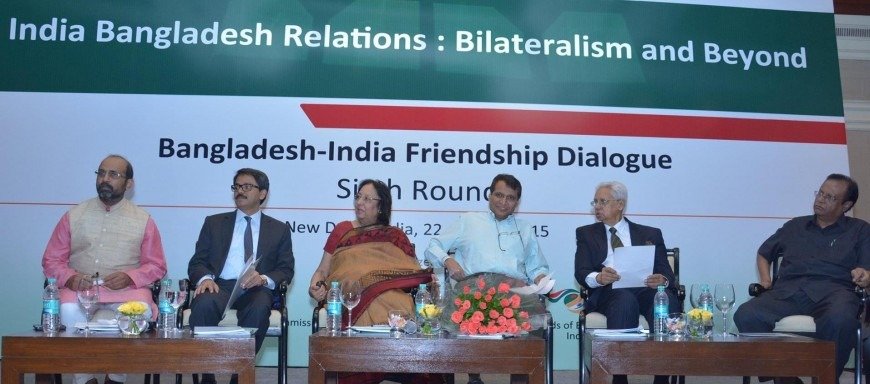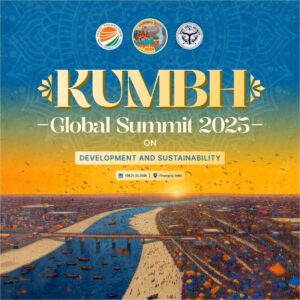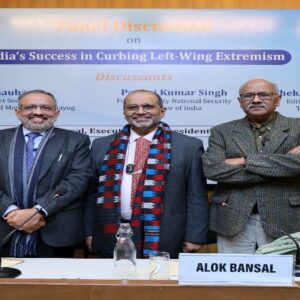The Sixth round of the Indo-Bangladesh Friendship Dialogue on “Bangladesh-India Relations: Bilateralism and Beyond” was organised jointly organized by the India Foundation, Friends of Bangladesh and Bangladesh High Commission in New Delhi on 22-23 May 2015 in New Delhi. The Dialogue witnessed high levels of participation from the political, media, executive and academic circles of both countries.
Day 1
Inaugural Session
The Inaugural Session took place at The Oberoi, New Delhi and began with the felicitation of the dignitaries- Capt. (Retd.) Alok Bansal, Director, Centre for Security and Strategy, India Foundation felicitated Mr. Shahriar Alam, Hon’ble State Minister for Foreign Affairs, Bangladesh; and Mr. ASM Shamsul Arefin, Secretary, Friends of Bangladesh Coordinating Chapter, Dhaka felicitated Dr. Najma Heptullah, Hon’ble Minister, Ministry of Minority Affairs, India. After this all the dignitaries present on the dais lighted the sacred lamp to mark the inauguration of the Dialogue.
The Welcome Remarks were delivered by H.E. Mr. Syed Muazzem Ali, High Commissioner of Bangladesh in New Delhi and Capt. (Retd.) Alok Bansal, India Foundation. Both the speakers highlighted the importance of the historic Land Boundary Agreement between the countries and contended that it was an important step in cementing the bilateral ties of both the countries.
The Keynote Address was delivered by the Chief Guest Shri Suresh Prabhu, Hon’ble Minister of Railways, Government of India and Director, India Foundation. He stressed on promoting the people to people relationships between the countries. He applauded the success of Government of Bangladesh in improving Human Development Indicators such as literacy rates, the issue of freedom and rights for women, implementation of family planning programmes and rural development, which the Indian government must learn from.
Mr. Shahriar Alam, Hon’ble State Minister for Foreign Affairs, Bangladesh delivered the second Keynote Address. In his speech, he stressed on important issues related to national security and territorial integrity especially with respect to the North East. He said that the shape of relationship between the countries was crucial as the lives and destinies of both the countries are interlinked hence, people to people relationships should be developed.
In her remarks, the Guest of Honour Dr. Najma Heptullah, Hon’ble Minister, Ministry of Minority Affairs, India said that the connections between India and Bangladesh are closer than ever before and she hoped that the visit of Shri Narendra Modi, Hon’ble Prime Minister of India o Dhaka will be a successful one.
The first day concluded with the Vote of Thanks and the presentation of gifts by Mr. ASM Shamsul Arefin to all the dignitaries present. In his speech he said that the Land Boundary agreement has given both the countries an opportunity to go ahead and develop their relations and to fight their wars together. He also expressed his thanks to Mr. Shahriar Alam for leading the delegation to India and also thanked India Foundation and Friends of Bangladesh.
At the end the All Party Parliamentary Group from Bangladesh presented mementos to all the dignitaries present on the dais.
Day 2:
The second day of the Dialogue was held on the 23rd May, 2015 in Gulmohar Hall, India Habitat Center. The day began with the much awaited Special Address by Foreign Secretary of India, Dr. S. Jaishankar. Talking about the ground-breaking Land Boundary Agreement which was recently ratified, Shri Jaishankar emphasized on how the two countries share the Ganges River and are co-dependent on conserving Sunderbans. He stressed that the Bhutan, Bangladesh, India and Nepal (BBIN) sub regional group needs to co-operate and hold useful discussions at senior levels to bring about positive changes in the relations with neighbouring countries.
This was followed by three different Working Sessions. The First Working Session, chaired by Shri Kiren Rijiju, Hon’ble Minister of State for Home Affairs, Government of India, had its focus on “Designing a dynamic security and confidence architecture for South Asia – encompassing border management, preventing Trans-National Crimes and trade in narcotic and psychotropic substances”. The Keynote Speakers for this session were Shri ML Kumawat, Former DGP, Border Security Force, & Vice-Chancellor, Sardar Patel University of Police, Security and Criminal Justice, Jodhpur and Maj Gen (Retd) Md Abdur Rashid, Executive Director, Institute for Conflict, Law and Development Studies, Bangladesh. The Panellists who participated in the discussion were Maj Gen (Retd) Afsir Karim, Editor, Aakrosh Journal; Dr Sreeradha Datta, Director, MAKAIAS, Kolkata; Prof. Dr. Syed Manzurul Islam, Department of English, Dhaka University; and Mr. Manzurul Ahsan Bulbul, President, Bangladesh Federal Union of Journalists & Editor in Chief, Baishakhi Television, Bangladesh
The focus of the Second Working Session was on “Designing intense connectivity networks through Infrastructure development – reconnecting the ancient production-trade-value-chains.” The session was chaired by Prof. Veena Sikri, Former High Commissioner of India to Bangladesh and Dr Prabir De, Professor, Research and Information System for Developing Countries, India and Amb. (Retd.) Muhammad Zamir, Former Chief Information Commissioner & Chairman, International Relations Committee, Bangladesh Awami League, were the lead Speakers. The Panellists for this session included Dr Nisha Taneja, Professor, ICRIER, New Delhi; Dr Smruti Pattanaik, Research Fellow, IDSA , New Delhi; Dr. Qazi Kholiquzzaman Ahmed, Chairman, Governing Council & Rector, Dhaka School of Economics, Bangladesh; Mr. Pankaj Debnath, MP and General Secretary, Bangladesh Swechcha Sebak League, Bangladesh
The Third Working Session primarily focussed on “Designing a comprehensive water and energy security model for South Asia.” The Chair for the Session was Amb. (Retd.) Muhammad Zamir, Former Chief Information Commissioner, Bangladesh & Chairman, International Relations Committee, Bangladesh Awami League. It had Two main speakers namely, Shri Sunjoy Joshi, Director, ORF, New Delhi and Prof. Ainun Nishat, Professor Emeritus, BRAC University. The Panellists were Ms. Mandakini Devasher Surie, Senior Program Officer, The Asia Foundation; Ms Shebonti Ray Dadwal, Research Fellow, IDSA, New Delhi; Mr. Abdul Wadud Dara, Member of Parliament & Chairman, Parliamentary Standing Committee, Bangladesh; and Dr. Qazi Kholiquzzaman Ahmed, Chairman, Governing Council & Rector, Dhaka School of Economics.
Valedictory Session –
The session began with the speech delivered by Shri Ram Madhav, National General Secretary, Bharatiya Janata Party and Director, India Foundation. In his speech Shri Ram Madhav said that this historic land boundary agreement could not have been possible without the strong will and decisiveness shown by our Hon’ble Prime Minister Shri Narendra Modi and with this agreement new heights in the relationship of the two countries will be achieved.
Mr. Shahriar Alam, Hon’ble State Minister for Foreign Affairs, Bangladesh in his speech said that this sixth Round of Dialogue has been the most successful one and further said that he and his delegation is going back to Dhaka with renewed enthusiasm and hope.
Shri Ajit Doval, National Security Adviser, Government of India in his speech said that the Indian Prime Minister is always focussed to see what India can do in the time when its neighbouring countries are in problem and this one year of his government has been the brightest year of relationships between the two countries and contended that both the countries are important for each other.
The “Delhi Declaration” was adopted, that is, the key points discussed during the two days of the dialogues were drafted and were adopted in form of a declaration.
At the end the Vote of Thanks was delivered by Mr. ASM Shamsul Arefin.





